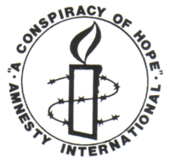
Youssou N'Dour is a Senegalese singer, songwriter, musician, composer, occasional actor, businessman, and politician. In 2004, Rolling Stone described him as, "perhaps the most famous singer alive" in Senegal and much of Africa and in 2023, the same publication ranked him at number 69 on its list of the 200 Greatest Singers of All Time. From April 2012 to September 2013, he was Senegal's Minister of Tourism.

The Secret Policeman's Ball is a series of benefit shows staged initially in the United Kingdom to raise funds for the human rights organisation Amnesty International. The shows started in 1976 featuring popular British comedians but later included leading musicians and actors. The Secret Policeman's Ball shows are credited by many prominent entertainers with having galvanised them to become involved with Amnesty and other social and political causes in succeeding years.
"Chimes of Freedom" is a song written and performed by Bob Dylan and featured on his Tom Wilson produced 1964 album Another Side of Bob Dylan. The song depicts the thoughts and feelings of the singer and his companion as they shelter from a lightning storm under a doorway after sunset. The singer expresses his solidarity with the downtrodden and oppressed, believing that the thunder is tolling in sympathy for them.
46664 was a series of AIDS benefit concerts played in honour of Nelson Mandela by South African and foreign musicians between 2003 and 2008.
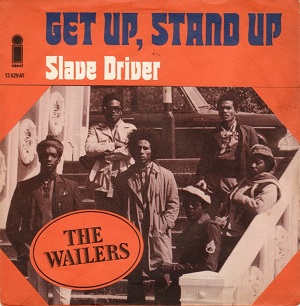
"Get Up, Stand Up" is a song written by Bob Marley and Peter Tosh. It originally appeared on The Wailers' 1973 album Burnin'. It was recorded and played live in numerous versions by Bob Marley and the Wailers, along with solo versions by Peter Tosh and Bunny Wailer. It was later included on the compilations Legend and Rebel Music, as well as live recordings such as Live at the Roxy among others. In 1973, "Get Up, Stand Up" peaked at number 33 on the Dutch Top 40. In 1986, it peaked at number 49 in New Zealand.

The Nelson Mandela 70th Birthday Tribute was a popular-music concert staged on 11 June 1988 at Wembley Stadium, London, and broadcast to 67 countries and an audience of 600 million. Marking the forthcoming 70th birthday of the imprisoned anti-apartheid revolutionary Nelson Mandela, the concert was also referred to as Freedomfest, Free Nelson Mandela Concert and Mandela Day. In the United States, the Fox television network heavily censored the political aspects of the concert. The concert is considered a notable example of anti-apartheid music.
David Sancious is an American musician. He was an early member of Bruce Springsteen's backing group, the E Street Band, and contributed to the first three Springsteen albums, and again on Human Touch (1992), Tracks (1998), and Western Stars (2019). Sancious is a multi-instrumentalist but is best known as a keyboard player and guitarist. He left the E Street Band in 1974 to form his own band, Tone, and released several albums. He subsequently became a popular session and touring musician, most notably for Stanley Clarke, Narada Michael Walden, Zucchero Fornaciari, Eric Clapton, Peter Gabriel, Jack Bruce, and Sting among many others. In 2014, Sancious was inducted into the Rock and Roll Hall of Fame as a member of the E Street Band.

Manu Katché is a French drummer and songwriter of Ivorian descent. He has worked extensively as a session musician, notably with Sting and Peter Gabriel, and his solo albums as a bandleader are largely in the jazz fusion style.

A benefit concert or charity concert is a type of musical benefit performance featuring musicians, comedians, or other performers that is held for a charitable purpose, often directed at a specific and immediate humanitarian crisis.

The National Sports Stadium is a multi-purpose stadium, in Harare, Zimbabwe, with a maximum capacity of 60,000 people. It is the largest stadium in Zimbabwe, located in Harare, just a Few meters from Heroes Acre. It is used mostly for football matches, but is also used for rugby union. Association football club CAPS United F.C. use the venue, which opened in 1987, for most of their home games.

The Ferenc Puskás Stadium, or formerly People's Stadium (Népstadion) was a multi-purpose stadium in the 14th district (Zugló) of Budapest, Hungary. It was situated between the Puskás Ferenc Stadion and the Keleti pályaudvar metro stations. It was used mainly for football matches. The stadium, which was an all-seater, in the 2000s had a safe capacity of 38,652, though its original capacity exceeded 100,000. The stadium was closed in 2016 and demolished in 2017 to give place to the Puskás Aréna.

The Felix Houphouet Boigny Stadium, nicknamed Le Félicia, is a multi-purpose stadium, which can host football, rugby union and athletics, in Abidjan, Ivory Coast. It is the former national stadium of the Ivory Coast national football team. It is named after the first president of the country, Félix Houphouët-Boigny, and is located in the commune of Le Plateau. The stadium has a capacity of 33,000. It also hosts matches of ASEC Mimosas. It has been the site of several deadly stampedes.

Human Rights Now! was a worldwide tour of twenty benefit concerts on behalf of Amnesty International that took place over six weeks in 1988. Held not to raise funds but to increase awareness of both the Universal Declaration of Human Rights on its 40th anniversary and the work of Amnesty International, the shows featured Bruce Springsteen and the E Street Band, Sting, Peter Gabriel, Tracy Chapman, and Youssou N'Dour, plus guest artists from each of the countries where concerts were held.
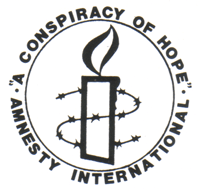
A Conspiracy of Hope was a short tour of six benefit concerts on behalf of Amnesty International that took place in the United States during June 1986. The purpose of the tour was not to raise funds but rather to increase awareness of human rights and of Amnesty's work on its 25th anniversary. The shows were headlined by U2, Sting and Bryan Adams and also featured Peter Gabriel, Lou Reed, Joan Baez, and the Neville Brothers. The last three shows featured a reunion of the Police. At press conferences in each city, at related media events, and through their music at the concerts themselves, the artists engaged with the public on themes of human rights and human dignity. The six concerts were the first of what subsequently became known collectively as the Human Rights Concerts – a series of music events and tours staged by Amnesty International USA between 1986 and 1998.

This is the solo discography of Peter Gabriel, an English singer-songwriter, musician and humanitarian activist who rose to fame as the lead vocalist and flautist of the progressive rock band Genesis. After leaving Genesis, Gabriel went on to a successful solo career. His 1986 album, So, is his most commercially successful, selling five million copies in America, and the album's biggest hit, "Sledgehammer", won a record nine MTV Awards at the 1987 MTV Video Music Awards. The song is the most played music video in the history of the station.
Habib Faye was a bassist, keyboardist, guitar soloist, arranger, composer and Grammy-nominated producer from Senegal. He was mostly known as the musical director for Youssou N'dour's Super Étoile de Dakar. He was one of the most talented African bassists of the last quarter-century.
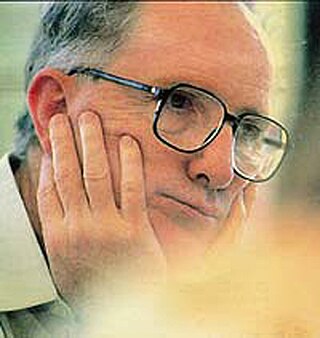
Jack Healey is an American human rights activist, author and the former director of Amnesty International USA. He is best known as the organizer of Amnesty's benefit concerts in the 1980s featuring bands like U2, the Police, Peter Gabriel, Bruce Springsteen, Sting, Sinead O’Connor, Bob Dylan, Santana, Tracy Chapman and others.
This is a list of audio, video and film releases of The Secret Policeman's Ball series of charity shows.
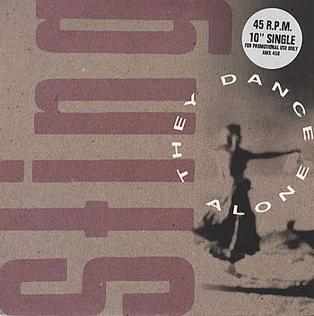
"They Dance Alone (Cueca Solo)" is a protest song composed by English musician Sting and published first on his 1987 album ...Nothing Like the Sun; the song was the fifth and final single released from the album. The song is a metaphor referring to mourning Chilean women (arpilleristas) who dance the Cueca, the national dance of Chile, alone with photographs of their disappeared loved ones in their hands.

Bill Shipsey is an Irish human rights activist, barrister (retired), artist event promoter, producer and consultant. He is the founder of Art for Amnesty, Amnesty International's global artist engagement programme, and the co-founder of Art 19. In November 2022 Art for Amnesty changed its name to Art for Human Rights. Shipsey remains its Executive Director. Art for Human Rights brings together artists of all disciplines in a collaborative effort to support human rights organisations including Amnesty International through the medium of the arts.
